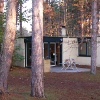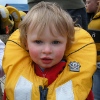Baby Sign Language - Makaton and British Sign Language
15 January 2007
I've been promising to post about Baby Sign Language for some time and I've finally got around to it. We first started teaching our daughter baby sign language when suggested by a friend because she seamed very aware of everything around her.
We specifically wanted to teach the British variant of Baby Sign language, which is what the rest of this post is about.
What is Baby Sign Language, and Why Is it Useful?
Baby sign language is a form of sign language that can be taught to babies and young children (toddlers). Normally sign language is used by people with hearing, speech or learning difficulties, but baby sign language is just as good for children without any disabilities.
Children don't normally learn to talk until they are between 18 months and 2 years, or older. Before they can speak they can understand what others are saying to them, and they often know what they want. They have more control over the hands than their speech. Baby Sign language therefore provides a way for a baby or toddler to communicate their wishes with others.
Some advantages of baby sign language
There are several advantages to teaching baby sign language. The reason we taught baby sign language is to allow our baby to communicate what she wants. That way we are better able to meet her needs and reduce her frustration.
Another advantage of Baby Sign language is that it helps the baby to develop their vocabulary and potentially improve the development of their speech. This is perhaps contrary to what some people automatically think, which I'll come to later.
It is thought that teaching baby sign language can help with mental development.
Another thing is that it is fun. It can be rewarding for both you and your child and help build a relationship with your child.
Destroying the Myth about Baby Signing and Speech Development
One myth that may put parents off teaching baby sign language is the concern that it may delay the child's speech development. From my experience I am confident that this is not the case. Our daughter is now 18 months old and she is starting to drop some of her signs in favour of saying the words instead.
One of the reasons that baby sign language can actually help children to learn to speak at an earlier age is that you should always state the word when making the sign. That reinforces the actual word as well as the sign, and because you tend to be more consistent with the words you use then it makes it easier for the child to understand.
How Easy is it to Learn and Teach
You can learn baby sign language from a book, DVD or at a class with other parents. We chose to get a book with DVD, and bought the one by Dr Joseph Garcia. Although the pictures in the book are good, I found that sometimes I misinterpreted the arrows showing hand movement, so I would recommend getting a DVD as well. The menu on the DVD isn't particularly good, but when used in conjunction with the book it is usable.
There are other (non baby specific) sign language based materials, including a CBeebies programme called Something Special. I however recommend you get a structured self-teach book / DVD for learning baby sign language initially.
The first signs are quite easy for the parent to learn, and then you can introduce new ones as you become more confident with the existing ones.
Teaching the child is also quite easy, but does require a lot of patience. We started teaching at about 6 to 8 months old, although you can start from about 4 months. It took about 2 to 3 months until our baby was confident in a few basic signs. The most important ones we taught her were Milk, Food, More and Finished, which were very useful when it came to meal times.
British Sign Language, American Sign Language and Makaton
When we decided we wanted to teach our baby, sign language we wanted to teach the British variant. I thought this was important for a number of reasons.
- It is a useful skill if we need to communicate with people that cannot communicate by speech, who know BSL
- It is similar to Makaton (a form of sign language used for people with learning disabilities), which a friend uses with their child
- It is useful if anyone else learns british sign language
- There are other useful sources of british sign language and Makaton, including the CBeebies programme Something Special
It was because of this that we chose Dr Joseph Garcia's book and DVD. Although Garcia uses American sign language in his US published books, he has created a British edition based on British Sign Language, which is very similar to Makaton.
The V.Smile Baby TV Console from Vtech includes some baby sign language in their "games". I would not however recommend these for use teaching baby sign language. The sign language taught is based on American sign language, and the examples do not make it clear how the signs are made. This is partly due to using animals / cartoon characters to perform the sign language, which is not at all clear.
See the full review of the V.Smile Baby - Baby and Child Development System.
How to begin
I'd recommend new parents to try baby signing. You can buy books from the First Aid Quiz Online Shop (Baby Sign Language Category), and get more information from Baby Signers. Although it's probably better to attend a course, it's certainly possible to learn baby sign language using books and DVDs.








 Days Out Diary Facebook page
Days Out Diary Facebook page @DaysOutDiary on Twitter
@DaysOutDiary on Twitter